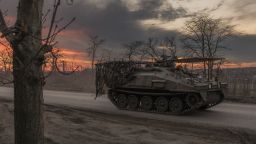Editor’s Note: Timothy?Snyder?is?the Richard C. Levin Professor of History and Global Affairs at Yale University and the?author?of “Bloodlands,” “Black Earth,” “On Tyranny” and the forthcoming “On Freedom.”?The views expressed in this commentary are his own. Read more?CNN Opinion.
On Thursday Russia will?celebrate Victory Day, its commemoration of the defeat of Nazi Germany in 1945.?Domestically, this?is nostalgia. In the 1970s, Soviet leader Leonid Brezhnev created a cult of victory. Russia under Putin has continued the tradition.
Abroad, this is intimidation. We are meant to think that Russia cannot lose.
And far too many of us, during Russia’s war of aggression in Ukraine, have believed that. In February 2022, when Russia undertook its full-scale invasion of its neighbor, the consensus was that Ukraine?would fall within days.
Even today, when Ukraine has held its own for more than two years, the prevailing view among?Russia’s friends in Congress?and?in the Senate?is?that Russia must eventually win. Moscow’s success is not on the battlefield, but in our minds.
Russia can lose. And it should lose, for the sake of the world — and for its own sake.

The notion of an invincible Red Army is propaganda. The Red Army was formidable, but it was also beatable. Of its three most consequential foreign wars, the Red Army lost two.
It was?defeated by Poland in 1920. It defeated Nazi Germany in 1945, after nearly collapsing in 1941. (Its win in that instance?was part of a larger coalition and with decisive American economic assistance.) Soviet forces were in trouble in Afghanistan immediately after their?1979 invasion?and had to withdraw a decade later.
And the Russian army of today is not the Red Army. Russia is not the USSR. Soviet Ukraine was a source of resources and soldiers for the Red Army. In that victory of 1945, Ukrainian soldiers in the Red Army took huge losses —?greater than American, British and French losses combined. It was disproportionately Ukrainians who fought their war to Berlin in the uniform of the Red Army.
Today, Russia is fighting not together with Ukraine but against Ukraine. It is fighting a war of aggression on the territory of another state.?And it lacks the American economic support —?Lend-Lease?— that the Red Army needed to defeat Nazi Germany. In this constellation, there is no particular reason to expect Russia to win. One would expect, instead, that Russia’s only chance is to prevent the West from helping Ukraine — by persuading us that its victory is inevitable, so that we don’t apply our decisive economic power.
The last six months bear this out: Russia’s minor battlefield victories came at a time when the United States was delaying Ukraine aid, rather than supplying it.
Today’s Russia is a new state. It has existed since 1991. Like Brezhnev before him,?Russian President Vladimir?Putin rules through nostalgia. He refers to the Soviet and also the Russian imperial past. But the Russian Empire also lost wars. It lost the Crimean War in 1856. It lost the Russo-Japanese War in 1905. It lost the First World War in 1917. In none of those three cases was Russia able to keep forces in the field for more than about three years.
In the United States there is great nervousness about a Russian defeat. If something seems impossible, we cannot imagine what could happen next. And so there is a tendency, even among supporters of Ukraine, to think that the best resolution is a tie.
Such thinking is unrealistic. And it reveals, behind the nerves, a strange American conceit.
No one can guide a war in such a way. And nothing in our prior attempts to influence Russia suggests that we can exercise that kind of influence. Russia and Ukraine are both fighting to win. The questions are: who will win, and with what consequences?
If Russia wins, the consequences are horrifying: a risk of a larger war in Europe, more likelihood of a?Chinese adventure?in the Pacific, the weakening of international legal order generally, the?likely?spread of nuclear weapons, the loss of faith in democracy.

It is normal for Russia to lose wars. And, in general, this led Russians to reflect and reform. Defeat in Crimea forced an autocracy to end serfdom. Russia’s loss to Japan led to an experiment with elections. The Soviet failure in Afghanistan led to Gorbachev’s reforms and thus the end of the cold war.
Beneath the Russian particularities, history offers a more general and still more reassuring lesson about empires. Russia is fighting today an imperial war. It denies the existence of the Ukrainian state and nation, and it?carries out atrocities?that recall the worst of the European imperial past.
The peaceful Europe of today consists of powers that lost their last imperial wars and then chose democracy. It is not only possible to lose your last imperial war: it is also good, not only for the world, but for you.
Russia can lose this war, and should, for the sake of Russians themselves. A defeated Russia means not only the end of senseless losses of young life in Ukraine. It is also Russia’s one chance to become a post-imperial country, one where reform is possible, one where Russians themselves might be protected by law and able to cast meaningful votes.
Defeat in Ukraine is Russia’s historical chance for normality — as Russians who want democracy and the rule of law will say.
Get Our Free Weekly Newsletter
- Sign up for CNN Opinion’s newsletter
- Join us on Twitter and Facebook
Like the United States and Europe, Ukraine celebrates the victory of 1945 on May 8th rather than May 9th. Ukrainians have every right to remember and interpret that victory: they suffered more than Russians from German occupation and died in huge numbers on the battlefield.
And Ukrainians are right to think that Russia today, like Nazi Germany in 1945, is a fascist imperialist regime that can and must be defeated. Fascism was defeated last time because a coalition held firm and applied its superior economic power. The same holds true now.

